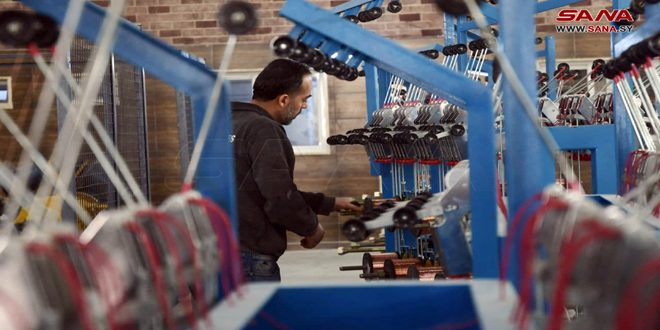The wheel of production has returned to work in the industrial city of Sheikh Najjar in Aleppo, where the number of productive industrial establishments has reached 830, of which 90 have returned to work during this year. The volume of investment reached 101 billion and 370 million Syrian pounds for this year, and the volume of cumulative investment since the beginning of its establishment and until today amounted to 410 billion and 778 million Syrian pounds.
Engineer Hazem Ajan, Director of the Industrial City in Sheikh Najjar, stated in a statement to SANA reporter that the industrial city went out of service for two years as a result of terrorism. After its liberation, the process of construction and reconstruction accelerated as more than 50 percent of its infrastructure has been restored and 99 percent of services have been provided to productive facilities, thus achieving continuation of production to contribute to building the national economy.
He pointed out that job opportunities were provided for more than 9,500 workers in the operation and restoration of facilities.
The area of the industrial city is 4,412 hectares and it contains all types of food, textile, engineering and chemical industries, he added, noting that there are areas for pharmaceutical industries, software, concrete products and shipping offices. There are residential areas occupying 800 hectares of the city’s area, green and craft areas, warehouses, administrative and commercial spots, and a fairground of an area of 20 hectares. This in turn would support the industrial product and market it.
He underlined the need to expand the electrical stations in the city, where three electrical transmission stations are currently in operation, and the fourth station will enter service early next year.
SANA correspondent toured a number of industrial facilities in the city of Sheikh Najjar. Industrialist Hamza Al-Youssef spoke about his industrial facility which produces sterilizers and antiseptics, and about the devastation and destruction that affected it as a result of terrorism. After the liberation of the city, the achievement of victory and the return of safety, he worked on restoring and reconstructing his facility and installing new production lines, so that he started production and worked to meet the need of the local market.
At Ghassan Mashhadi Sons facility for food industries, Engineer Abdul Karim Alloush, an expert in the manufacture of ghee and vegetable oils, noted that the facility has started work after its restoration, highlighting the joint efforts by those in charge of it to supply the market with local products of pasta, ghee and vegetable oils. He stressed the determination of the industrialists to re-work in the industrial city better than it was, calling on all industrialists to return to their facilities, restore them and start over again.
At the Sheikh Debs Factory for glass tempering, Muhammad Sabbagh, the director of the factory, said that the facility was producing types of tempered glass before the crisis, and with the entry of terrorism into the industrial city, work stopped. The factory was destroyed and production lines were stolen, but with the liberation of the city and victory over terrorism, the facility returned to production.
Director of Al-Shahba Iron Rolling Company Jean Khabu, who has returned to producing types of industrial iron since 2018, called on the concerned authorities to secure electricity to prevent losses to the production.
Inas Abdulkareem

